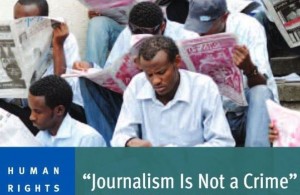Human Rights Watch report highlights Ethiopia regime’s fear of digital technologies

World human rights body Human Rights Watch says Ethiopia is one of the countries in which state fear of the potential for digital technologies to drive political and social movements, is fostering repression of media, civil protests and civil society organizations.
In 2009, the country enacted legislation (The Charities and Societies Proclamation) banning civil society organizations in human rights and governance, from having more than 10 per cent of their funding from foreign sources.
“An attack on the right of organizations to seek funding abroad is really an attack on organized efforts to hold government to account”, Human Rights Watch says.
According to Human Rights Watch’s report for 2016, Ethiopia in 2015 saw “continuing government crackdowns on opposition political party members, journalists and peaceful protesters, many of whom experienced harassment, arbitrary arrest, and politically motivated prosecutions.
Eighteen leaders of a Muslim protest movement against perceived state interference in religious affairs, were sentenced to between seven and 22 years each, after what Human Rights Watch described as “closed, flawed trials.”
Human Rights Watch says political detainees were tortured and ill-treated by security personnel and though Ethiopia accepted a recommendation at its UN Universal Periodic Review in 2014 to “adopt measures which guarantee the non-occurrence of cases of torture and ill-treatment in places of detention,” there is little to show that security personnel are being investigated or sanctioned for abuses.
Ethiopian authorities have not investigated the use of excessive and lethal force by security personnel during protests by Oromos against the planned expansion of Addis Ababa’s municipal boundary into the Oromia region.
There were a few high-profile prisoner releases ahead of President Barack Obama’s visit to the country in June, including the release of six journalists and bloggers but there was no progress on fundamental reforms of the deeply repressive laws and policies constricting Ethiopia’s media and civil society organizations.
At least 60 journalists are said to have fled the country since 2010 and according to the 2016 human rights report, the media in 2015 “remained under government stranglehold, with many journalists having to choose between self-censorship, harassment and arrest, or exile.”
A 2015 report on the country’s media said Ethiopia has the second highest number of journalists in exile.
In May 2015, federal elections were held in a general atmosphere of intimidation and concerns over the independence of the National Electoral Board.
The ruling party coalition – the Ethiopian People’s Revolutionary Democratic Front (EPRDF) – won all 547 parliamentary seats in the May elections, partly due to the lack of space for dissenting voices.
According to Human Rights Watch, the Ethiopian government also regularly monitors and records telephone conversations of family members and friends of suspected opposition members, with highly intrusive spyware.
There is also forced displacement of persons during development projects, with little or no compensation and little prior consultation.
Worryingly, the report says Ethiopia continues to receive a lot of development assistance, nearly $3 billion in 2015, and donors do not appear to have strengthened the monitoring and accountability provisions needed to ensure that their development aid does not contribute to human rights problems in the country.
By Emmanuel Odonkor
